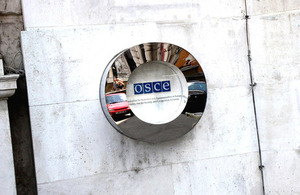UK Statement on Preventing Sexual Violence in Conflict
Organization for Security and Co-operation in Europe holds its Human Dimension Implementation meeting, Warsaw, Poland

UK statement to Working Session 3
24th September 2013
I align myself with the statement made by Estonia on behalf of the EU and its Member States. Our national remarks focus on the prevention of violence elements of this afternoon’s discussion and in particular UK efforts to encourage greater international attention to the prevention of sexual violence in conflict.
The widespread use of rape and other forms of sexual violence in armed conflicts is one of the greatest, most persistent and most neglected injustices. It represents one of the most serious violations of an individual’s human rights. It can significantly exacerbate situations of armed conflict and it impedes the restoration of peace and security. The British Government has made tackling this issue a high Foreign Policy priority, using its Presidency of the G8 in 2013 to mobilise the international community. These efforts have led to results including a G8 Foreign Ministers’ Declaration in April 2013 and UNSCR 2106 adopted in June.
We must put an end to impunity, promote justice and provide greater support to victims. To succeed we need political will coupled with real practical action. In addition to our global efforts, the UK is working with partners in South Eastern Europe to address the legacy of sexual violence from the conflict in the Balkans.
Later today at the UN General Assembly in New York, the British Foreign Secretary will launch a Declaration on the Prevention of Sexual Violence in Conflict. We hope this will achieve the widest possible support . He has established a group of Champions who will help to ensure this message is heard and sustained. Six of the Champions are from OSCE participating States and another is a Partner for Cooperation.
The UNGA Declaration reaffirms that serious sexual violence in conflict constitutes a grave breach of the Geneva Conventions. It supports the development of an International Protocol on the documentation and investigation of sexual violence in conflict.
“ We are pursuing a number of steps to achieve this including:
-
working to strengthen the efforts of regional organisations to prevent and respond to sexual violence;
-
to ensure national military and police doctrine and training complies with international law;
-
to ensure that all conflict mediation processes explicitly recognise the need to prevent, respond to and reduce crimes of sexual violence in conflict;
-
to encourage, support and protect the efforts of civil society organisations to improve the monitoring and documentation of cases of sexual violence in conflict.”
All of these activities could and should involve OSCE participating States, its Institutions and Field missions, not to mention many of the NGOs represented here. We welcome all ideas and suggestions for activities. Some specific ideas that we have include:
The OSCE Forum for Security Co-Operation’s Military Doctrine Seminars could include this topic, as could its discussions on the Code of Conduct – specifically its provisions on International Humanitarian Law.
Training organised by the OSCE’s Strategic Police Matters Unit could include the investigation and prosecution of cases of sexual violence.
Preventing sexual violence should be addressed within the OSCE’s work on the Conflict Cycle and Mediation.
And finally we believe there would be benefit to all participating States in the development of an Action Plan on Women, Peace and Security.
In conclusion we believe that the international community can and must do more to prevent and respond to these acts of barbarism. The OSCE and its participating States are well placed to make such a contribution: now is the time to act.
Follow us on Twitter: @UKOSCE